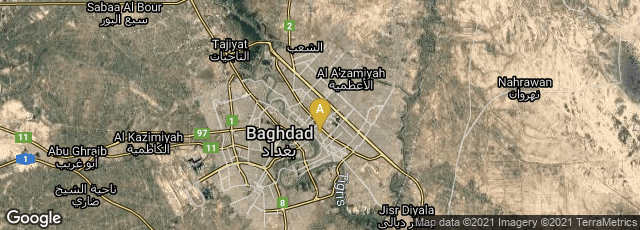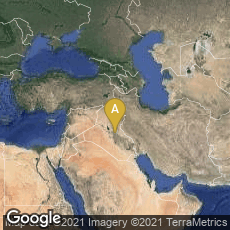

A: Baghdad, Al Saadoon Park, Baghdad Governorate, Iraq
In 751 the second Abbassid Caliph, Abu Ja'far Al-Mansur, founded the city of Baghdad. There he founded a palace library, which, according to some sources, evolved into The House of Wisdom. According to those sources, the library was originally concerned with translating and preserving Persian works, first from Pahlavi (Middle Persian), then from Syriac and eventually Greek and Sanskrit. One standard view was encountered in the Wikipedia article, from which I quote:
"The House of Wisdom acted as a society founded by Abbasid caliphs Harun al-Rashid and his son al-Ma'mun who reigned from 813-833 CE. Based in Baghdad from the 9th to 13th centuries, many of the most learned Muslim scholars were part of this excellent research and educational institute. In the reign of al-Ma'mun, observatories were set up, and The House was an unrivalled centre for the study of humanities and for sciences, including mathematics, astronomy, medicine, chemistry, zoology and geography. Drawing on Persian, Indian and Greek texts—including those of Pythagoras, Plato, Aristotle, Hippocrates, Euclid, Plotinus, Galen, Sushruta, Charaka, Aryabhata and Brahmagupta—the scholars accumulated a great collection of knowledge in the world, and built on it through their own discoveries. Baghdad was known as the world's richest city and centre for intellectual development of the time, and had a population of over a million, the largest in its time.The great scholars of the House of Wisdom included Al-Khawarizmi, the "father" of algebra, which takes its name from his book Kitab al-Jabr" (Wikipedia article on House of Wisdom, accessed 12-01-2008).
In 2014 I read Dimitri Gutas's Greek Thought, Arabic Culture. The Graeco-Arabic Translation Movement in Baghdad and Early 'Abbasid Society (2nd-4th/8th-10th centuries.) (1998). In that book Gutas presented a significantly different view of the bayt al-hikma, or House of Wisdom. From his summary on the topic (pp. 58-60) I quote:
"This is all the substantive and reliable evidence that we have and it allows only the following reconstruction of the nature and function of the bayt al-hikma: It was a library, most likely established as a 'bureau' under al Mansur, part of the 'Abbasid administration modeled on that of the Sasanians. Its primary function was to house both the activity and the results of translations from Persian into Arabic of Sasanian history and culture. As such there were hired translators capable to perform this function as well as book binders for the preservation of books. . . This was its function in Sasanian times, and it remained it throughout the time of Harun ar-Rasid, i.e. the time of Barmakids. Under al-Ma'mun it appears to have gained an additional function related to astrononomical and mathematical activities; at least this is what the names associated with the bayt-al-hikma during that period would imply. We have, however, no specific information about what those activities actually were; one would guess research and study only, since none of the people mentioned was himself actually a translator. Al-Ma'mun's new rationalist ideological orientations, discussed in chapter 4, would explain the additional functions of the library during his reign.
"This then is all we can safely say about the bayt al-hikma. We have abolutely no evidence for any other sort of activity. It was certainly not a center for the translation of Greek works into Arabic; the Graeco-Arabic translation movement was completely unrelated to any of the activities of the bayt-al-hikma. Among the dozens of reports about the translation of Greek works into Arabic that we have, there is not even a single one that mentions the bayt-al-hikma. This is to be contrasted with the references to translations from the Persian; we have few such references and yet two of them, both in the Fihrist cited above, do mention the bayt-al-hikma. Most amazingly, the first hand-report about the translation movement by the great Hunayn himself does not mention it. By the same token, the library was not one which stored, as part of its mission, Greek manuscripts. Hunayn mentions the efforts he expended in search of Greek manuscripts and again he never mentions that he looked for them right under his nose in the bayt al-hikma in Baghdad (cf. chapter 7.4). Ibn-an-Nadim, who claims that his Himyarite and Ethiopian manuscripts came from al-Ma'mun's library, says nothing of the sort when he describes the different kinds of Greek writing.
"The bayt-al-hikma was certainly also not an 'academy' for teaching the 'ancient sciences as they were being translated; such a preposterous idea did not even occur to the authors of the spurious reports about the transmission of the teaching of these sciences that we do have (discussed in chater 4.2). Finally, it was not a 'conference' center for the meetings of scholars even under al-Ma'mun's sponsorship. Al-Ma'mun, of course (and all the early 'Abbasid caliphs), did host scholarly conferences or rather gatherings, but not in the library; such gauche social behavior on the part of the caliph would have been inconceivable. Sessions (magalis) were held in the residences of the caliphs, when the caliphs were present, or in private residences otherwise, as the numerous descriptions of them that we have indicate (for one hosted by al-Ma-mun see chapter 4.3).
"What the bayt-al-hikma did do for the Graeco-Arabic translation movement, however, is to foster a climate in which it could be both demanded and then conducted successfully. If indeed the bayt-al-hikma was an 'Abbasid administrative bureau, then it institutionalized the Pahlavi into Arabic translation culture. This means that all activities implied or suggested by this culture—the Zorastrian ideology of the recovery of ancient Avestan texts through the (re-) translation of Greek works and all that that implied—could be conducted as semi-official activities, or at least as condoned by official policy. The numerous translations from the Greek which were commissioned by the Barmakids, for example should be seen in this light. The example set by the caliphs and the highest adminstrators was naturally followed by the others of lesser rank, both civil servants and private individuals. Once the existence of this additional official—though indirectly so—sanction for Graeco-Arabic translations is realized, the origins and rapid spread of the movement in early 'Abbasid times is better understood."
The House of Wisdom is thought to have flourished until it was destroyed by the Mongols in the sacking of Baghdad in 1258.
(This entry was last revised on 05-02-2014.)